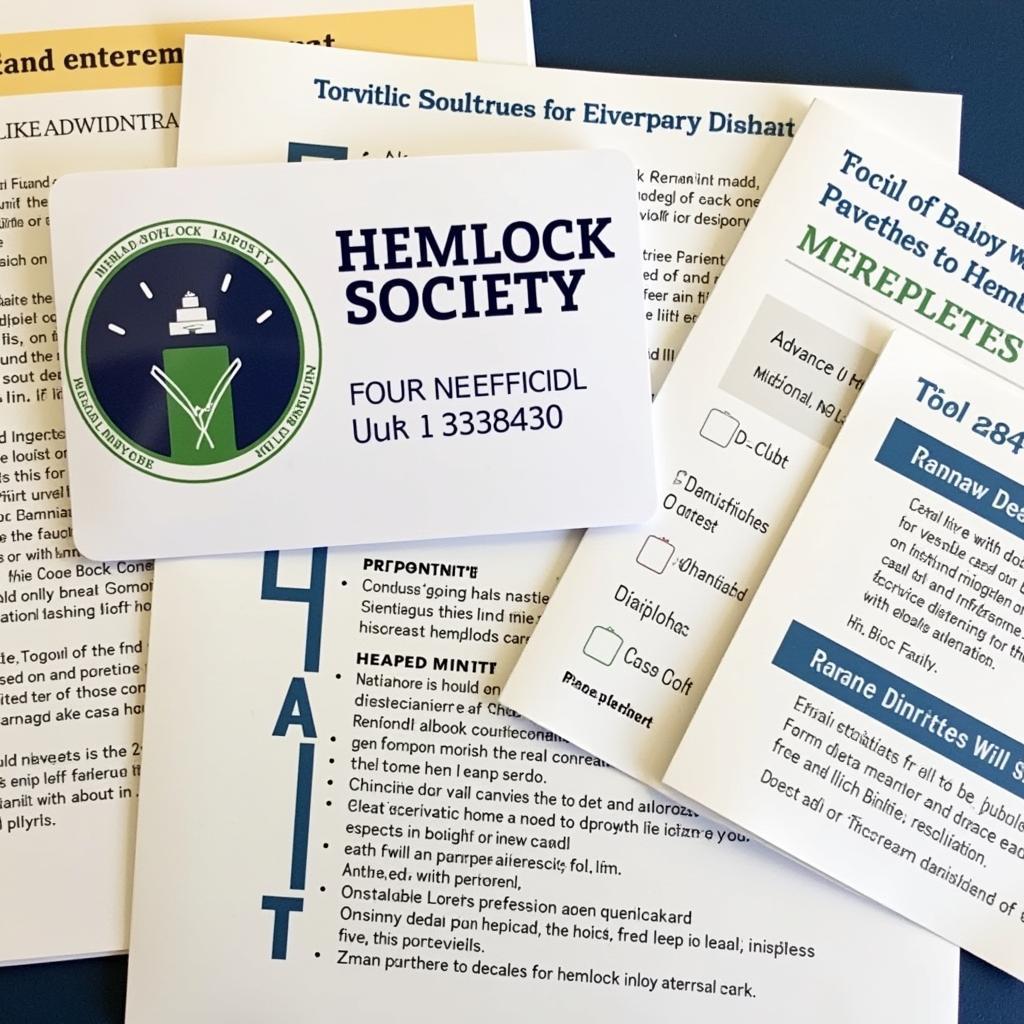The term “Hemlock Society Membership” often evokes complex emotions and raises crucial questions about end-of-life choices. This article aims to explore the history and evolution of organizations like the Hemlock Society, examining their role in advocating for the right to die with dignity and providing information about end-of-life options. We’ll delve into the ethical considerations surrounding these choices, emphasizing the importance of compassionate care and support during life’s final stages.
Discussions about death and dying can be difficult, but they are necessary for fostering a society that respects individual autonomy and provides support for those facing challenging decisions at the end of their lives. Organizations advocating for the right to die with dignity have played a significant role in shaping public discourse and legal frameworks related to end-of-life care.
The Evolution of Right-to-Die Organizations: From Hemlock Society to Compassion & Choices
The original Hemlock Society, founded in 1980, was a pioneering organization in the right-to-die movement. It provided information and support for individuals seeking control over their final moments. Over time, the organization evolved, merging with Compassion in Dying to become Compassion & Choices. This new entity broadened its focus to encompass a wider range of end-of-life options, including palliative care, hospice, and advance care planning. The shift reflects a growing understanding of the multifaceted nature of end-of-life decisions and the importance of a holistic approach.
What Did Hemlock Society Membership Entail?
Historically, hemlock society membership provided access to resources, including information on physician-assisted dying, advance directives, and legal aspects of end-of-life care. Members also received support and guidance on navigating the complex emotional and practical challenges associated with end-of-life decisions. While the Hemlock Society no longer exists as a separate entity, its legacy continues through Compassion & Choices, which offers similar resources and support to its members.
Access to Information and Support: A Critical Resource
The Hemlock Society played a crucial role in providing information about end-of-life choices when such resources were scarce. Membership offered a lifeline to individuals seeking knowledge and support to make informed decisions about their final days.
 Hemlock Society Membership Benefits
Hemlock Society Membership Benefits
Exploring End-of-Life Options: Beyond Hemlock Society Membership
Today, individuals seeking information about end-of-life options can access a wide range of resources, both online and within their communities. Palliative care, hospice, and advance care planning are essential components of a comprehensive approach to end-of-life care. These options focus on managing pain and symptoms, providing emotional and spiritual support, and ensuring that individuals’ wishes are respected.
Palliative Care: Focusing on Comfort and Quality of Life
Palliative care is a specialized medical care for people living with serious illnesses. It focuses on providing relief from symptoms, pain, and stress of a serious illness—whatever the diagnosis. The goal is to improve quality of life for both the patient and the family.
Hospice Care: Supporting Patients in Their Final Stages
Hospice care provides compassionate support for individuals nearing the end of life. It focuses on comfort and quality of life rather than curative treatment. Hospice services can be provided at home, in a hospice facility, or in other settings, such as hospitals or nursing homes.
Navigating the Ethical Landscape of End-of-Life Choices
Ethical considerations surrounding end-of-life decisions are complex and deeply personal. Respecting individual autonomy, ensuring informed consent, and providing compassionate care are paramount. Open and honest communication between patients, families, and healthcare providers is crucial for navigating these sensitive issues. Discussions about end-of-life choices should be approached with empathy and sensitivity, recognizing the emotional and spiritual dimensions of these decisions.
The legacy of the Hemlock Society continues to shape the conversation around end-of-life choices. While “hemlock society membership” is no longer relevant, the quest for dignified and autonomous end-of-life care remains a critical issue. By understanding the history and evolution of this movement, we can work towards a future where individuals are empowered to make informed decisions about their final moments and receive the support they need to die with dignity and peace. This journey towards compassionate end-of-life care requires ongoing dialogue, education, and advocacy.
FAQ
- What is the difference between palliative care and hospice care?
- What are advance directives, and why are they important?
- How can I start a conversation with my family about my end-of-life wishes?
- What resources are available to support individuals making end-of-life decisions?
- What are the legal aspects of physician-assisted dying in my state?
- How can I find a qualified palliative care or hospice provider?
- What are the ethical considerations surrounding end-of-life choices?
For further information about historical perspectives, you can visit our page on the historical society of washington state.
Need more information? Explore related articles on our website for more in-depth discussions on end-of-life care, advance care planning, and other related topics.
When you need support, please contact us: Phone: 02043854663, Email: [email protected] Or visit our address: Khu 34, Bac Giang, 260000, Vietnam. We have a 24/7 customer service team.